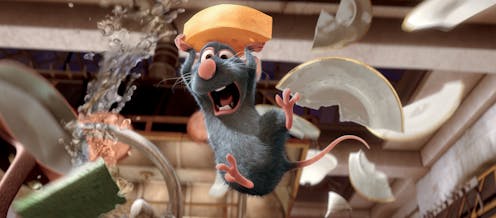TikTokkers are writing Ratatouille, the musical. But who owns the copyright?
- Written by Daniela Simone, Senior lecturer, Macquarie University

Thousands of TikTok users have been creating a musical based on Disney/Pixar’s 2007 film Ratatouille under the hashtag #ratatouillemusical.
It began when US-based schoolteacher Emily Jacobsen wrote a “love ballad” in honour of Remy, the anthropomorphic rat with an acute sense of smell and taste who dreams of becoming a chef.
Jacobsen’s clip was then transformed by Daniel Mertzlufft, a composer and arranger, who revamped the song. Adding strings, trumpets, additional vocals and French horn, he turned it into a big musical number, capturing the imagination of thousands of TikTok users.
Soon others joined in: writing songs, crafting choreography and designing sets, costumes, makeup, puppets — and even the playbill. Others imagined the rehearsal process and the artistic director’s notes.
The result is a viral sensation. Even Disney has picked up the enthusiasm, with the Disney Parks TikTok account posting their own contribution — a Hamilton-esque rap about Remy’s culinary ambitions.
But what if Disney wanted to bring this collectively written musical to stage? Could they? And could Ratatouille The Musical be a ticket to riches for these gifted Gen Zers?
Who owns the copyright?
Generally speaking, anyone who makes their own song or dance on TikTok automatically owns the copyright. Copyright also allows for joint authorship, but it usually requires the authors to have been working together on a common aim — could this be said of TikTok creators who take and build on each others’ works sequentially?
Working out authorship is only the first hurdle. Because creators are located all around the world, different copyright and contract laws come into play.
And these creators are not only building on each other’s creations, they are also building off Disney’s original movie.
This means there might be potential, (as unlikely as it seems,) for Disney to sue the TikTokkers for their use of Remy. In the United States and some other jurisdictions, it is possible to assert copyright in fictional characters.
This is more complicated in places like Australia, where at least one eager TikTokker, Gabbi Bolt, is crafting songs for the musical. Here, characters themselves are not protected by copyright, but aspects could be protected under the broader copyright encompassing the movie’s story and artwork.
Infringement would turn on whether a “substantial part” has been copied — something difficult to assess as it’s a matter of degree.
Mind you, as long as the collaborations stay on TikTok, it seems unlikely Disney will sue. In a statement, the company told the New York Times “we love when our fans engage with our stories”.
But who can get paid?
Even though the TikTok users own their copyright, as a condition of participating on the platform, they agree to the terms of service. These terms are complex and hard to navigate — but it appears users grant TikTok a very broad irrevocable, perpetual, sublicensable right to copy, modify and share their content on a royalty-free basis.
This licence is non-exclusive so (in theory) TikTokkers could license their videos to others, such as Disney — but the terms imply that users can only access and use any TikTok content for “personal, non-commercial use”.
It’s not clear from the terms exactly what this personal use would cover. In addition, TikTokkers specifically renounce the right to remuneration for their creativity except as provided for in the terms of service.
(It seems even sponsored posts could be contrary to the terms of service, despite being so widespread. For stars like Charli D'Amelio, TikTok clearly tolerates — or has agreed to — some commercial uses.)
Under the terms of service, TikTokkers also waive their “moral rights”: anyone who uses their work doesn’t need to attribute them as authors, which they would normally have to do in Australia.
This means Disney could use the creative contributions of the users without having to compensate the creators, or even recognise them as authors.
So it seems the TikTokkers can’t get paid. But TikTok can. Under the terms of service, users agree TikTok can authorise others to make derivative works based on their work in any format or on any platform.
Disney would probably need to get TikTok’s permission to make any commercial use of the songs, artworks and dances uploaded on its service.
And while the TikTokkers who create the content are not allowed to receive any money for their work, nothing in the terms of service prevents TikTok from charging Disney a hefty fee for granting such permission.
A double sided coin
The story of #ratatouillemusical illustrates the two sides of social media services such as Instagram or TikTok, which can launch an artist or creator while, at the same time, making it challenging for them to monetize their content.
TikTok has recently launched a Creator Fund, allowing eligible “ambitious creators” to earn money off their videos, so far some users seem disappointed with the service which reportedly pays between 2 and 4 cents per 1,000 views.
And while there are agreements in place with some recording labels and independent distributors about the use of background music, this doesn’t really help amateur contributors.
Under COVID-19, we have seen a huge surge in collaborative creativity and a growing reliance on platforms such as TikTok for socialising and entertainment.
These are exciting opportunities — but the intellectual property implications of conducting more and more of our lives online have yet to be fully thought through.
Authors: Daniela Simone, Senior lecturer, Macquarie University





